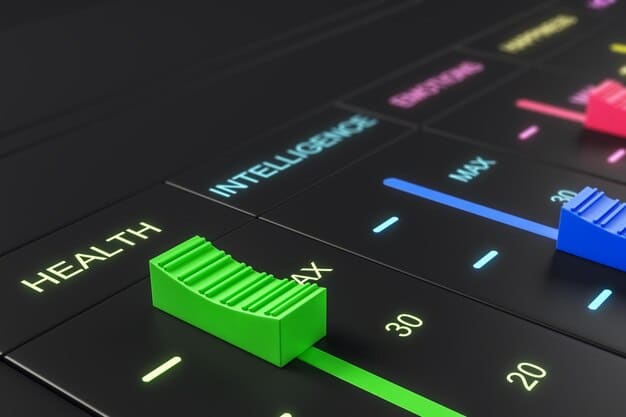AI-Driven Drug Discovery: Revolutionizing US Medicine Development

AI-Driven Drug Discovery: Accelerating the Development of New Medicines in the US Pharmaceutical Industry is transforming how new therapies are created, speeding up the process, reducing costs, and increasing the likelihood of success by leveraging artificial intelligence to analyze vast datasets and predict drug efficacy.
The landscape of pharmaceutical research in the United States is undergoing a seismic shift, thanks to the introduction of AI-Driven Drug Discovery: Accelerating the Development of New Medicines in the US Pharmaceutical Industry. This innovative approach is not just a technological upgrade; it’s a complete reimagining of how drugs are discovered, developed, and brought to market.
The Dawn of AI in US Drug Discovery
The integration of artificial intelligence (AI) into the drug discovery process marks a significant turning point for the pharmaceutical industry in the United States. For decades, the traditional drug development pipeline has been characterized by lengthy timelines, high costs, and a substantial failure rate. AI-Driven Drug Discovery: Accelerating the Development of New Medicines in the US Pharmaceutical Industry offers a solution to many of these challenges by streamlining various stages.
By utilizing machine learning, deep learning, and other AI techniques, researchers can now analyze vast amounts of data, predict drug efficacy, and identify potential drug candidates with greater accuracy and speed. This transformative approach promises to revolutionize the pharmaceutical landscape, leading to more efficient drug development and improved healthcare outcomes for patients across the nation.
Advantages of AI-Driven Drug Discovery
AI’s impact on drug discovery brings numerous advantages over traditional methods. These include:
- Speed and Efficiency: AI algorithms can sift through massive datasets far faster than human researchers, significantly shortening the drug discovery timeline.
- Cost Reduction: By identifying promising drug candidates early on and predicting potential failures, AI can save pharmaceutical companies substantial amounts of money.
- Improved Accuracy: AI algorithms can analyze complex data patterns and relationships, leading to more accurate predictions and a higher success rate in clinical trials.
- Personalized Medicine: AI can help tailor drug treatments to individual patients based on their genetic makeup, lifestyle, and other factors, leading to more effective and targeted therapies.
In essence, AI is transforming the drug discovery process from a largely trial-and-error endeavor to a more data-driven and predictive science.
In conclusion, the integration of AI into US drug discovery signifies a paradigm shift, promising accelerated timelines, reduced costs, and enhanced accuracy. This transformative approach paves the way for more efficient drug development and personalized medicine, benefiting patients nationwide.
Identifying Promising Drug Candidates with AI
One of the most significant applications of AI in AI-Driven Drug Discovery: Accelerating the Development of New Medicines in the US Pharmaceutical Industry is its ability to identify promising drug candidates. Traditionally, this process involves screening thousands of compounds in a laboratory, a time-consuming and expensive undertaking. AI algorithms can analyze vast chemical databases and predict which molecules are most likely to bind to specific drug targets.
Machine learning models can be trained on existing drug data, including chemical structures, biological activity, and clinical trial results, to identify patterns and relationships that would be difficult for humans to detect. This allows researchers to narrow down the list of potential drug candidates and focus their efforts on those with the highest likelihood of success.

AI Techniques for Candidate Identification
Several AI techniques are used to identify promising drug candidates, including:
- Virtual Screening: AI algorithms can screen millions of compounds in silico, predicting their binding affinity to drug targets.
- Structure-Based Drug Design: AI can analyze the three-dimensional structure of drug targets to design molecules that specifically bind to them.
- Ligand-Based Drug Design: AI can identify molecules with similar structures and biological activity to known drugs, providing starting points for new drug development.
- De Novo Drug Design: AI can generate entirely new molecules with desired properties, opening up new avenues for drug discovery.
Real-World Examples of AI in Candidate Identification
Several pharmaceutical companies in the US have already successfully used AI to identify promising drug candidates. For example, Atomwise uses AI to identify potential drug candidates for a variety of diseases, including cancer and infectious diseases. Similarly, Exscientia has partnered with several pharmaceutical companies to accelerate drug discovery using AI. These examples highlight the growing importance of AI in the early stages of drug development.
To summarize, AI is revolutionizing the identification of promising drug candidates by enabling rapid screening, structure-based design, and de novo drug design. This leads to faster and more efficient pathways to discover potential therapies, ultimately accelerating the development of new medicines.
Optimizing Clinical Trials with AI
Clinical trials are a critical and costly component of drug development. AI is being used to optimize various aspects of clinical trials, making them more efficient and increasing the likelihood of success. AI-Driven Drug Discovery: Accelerating the Development of New Medicines in the US Pharmaceutical Industry can assist with trial design, patient selection, and data analysis.
By analyzing patient data, AI algorithms can identify biomarkers that predict drug response, allowing researchers to select patients who are most likely to benefit from a particular treatment. This personalized approach can significantly improve the success rate of clinical trials and reduce the time and cost associated with bringing new drugs to market.
AI Applications in Clinical Trials
Here are some ways AI is improving clinical trials:
- Trial Design: AI can optimize trial design by identifying the most appropriate patient population, dosage, and endpoints.
- Patient Selection: AI can analyze patient data to identify individuals who are most likely to respond to a particular treatment.
- Data Monitoring: AI can monitor clinical trial data in real-time, identifying potential safety issues and ensuring data integrity.
- Predicting Trial Outcomes: AI can predict the likelihood of success of a clinical trial based on early data, allowing companies to make informed decisions about whether to continue development.
Several US-based companies are pioneering the use of AI in clinical trials. For instance, companies like Datavant and ConcertAI are leveraging AI to analyze real-world data and improve patient outcomes.

In summary, AI greatly enhances clinical trials by aiding in trial design, patient identification, and real-time data monitoring, leading to more efficient and successful trials. This boosts the potential for faster drug approvals and better patient outcomes in the US.
Challenges and Ethical Considerations
While the potential benefits of AI-Driven Drug Discovery: Accelerating the Development of New Medicines in the US Pharmaceutical Industry are significant, there are also challenges and ethical considerations that must be addressed. These include data privacy, bias in algorithms, and the potential for job displacement. It is essential to approach the implementation of AI in drug discovery in a thoughtful and responsible manner.
Data privacy is a major concern, as AI algorithms require access to large amounts of patient data. Ensuring that this data is protected and used in accordance with privacy regulations is crucial. Furthermore, bias in algorithms can lead to unfair or discriminatory outcomes, so it is important to carefully vet and validate AI models to ensure that they are fair and unbiased.
Addressing the Challenges
Here are some steps that can be taken to address the challenges of AI in drug discovery:
- Data Privacy: Implement robust data security measures and comply with all relevant privacy regulations, such as HIPAA.
- Algorithm Bias: Carefully vet and validate AI models to ensure that they are fair and unbiased. Use diverse datasets for training to minimize bias.
- Job Displacement: Invest in training programs to help workers adapt to new roles and responsibilities as AI transforms the pharmaceutical industry.
In addition, it is crucial to have open and transparent discussions about the ethical implications of AI in drug discovery. Stakeholders, including pharmaceutical companies, regulators, and the public, must work together to develop guidelines and best practices that ensure AI is used in a responsible and ethical manner.
In conclusion, addressing data privacy concerns, mitigating bias in algorithms, and managing job displacement are crucial for the ethical implementation of AI in US drug discovery. Transparent discussions and collaborative efforts among stakeholders will ensure responsible development and use of AI technologies.
The Regulatory Landscape for AI in US Drug Development
The regulatory landscape for AI in drug development in the United States is still evolving. The Food and Drug Administration (FDA) is actively working to develop guidelines and regulations that ensure the safe and effective use of AI in the pharmaceutical industry. AI-Driven Drug Discovery: Accelerating the Development of New Medicines in the US Pharmaceutical Industry requires careful oversight to ensure compliance with existing regulations and to address new challenges that arise as AI becomes more prevalent.
The FDA has already taken steps to promote the use of AI in drug development, including establishing a Center of Excellence for Digital Health and launching pilot programs to evaluate the use of AI in clinical trials. However, much work remains to be done to create a clear and comprehensive regulatory framework that supports innovation while protecting patient safety.
FDA’s Role in Regulating AI
The FDA is focused on several key areas:
- Data Quality: Ensuring the quality and reliability of the data used to train AI algorithms.
- Algorithm Validation: Developing methods for validating AI algorithms and assessing their performance.
- Transparency: Promoting transparency in the development and use of AI in drug discovery.
Collaboration between the FDA and pharmaceutical companies is essential to ensure that AI is used in a safe and effective manner. By working together, stakeholders can develop best practices and guidelines that promote innovation while protecting patient safety.
To summarize, the FDA’s ongoing efforts to create clear and comprehensive regulations are essential for the safe and effective integration of AI into US drug development. Collaborative efforts between the FDA and pharmaceutical companies will foster innovation and ensure AI’s responsible use.
Future Trends in AI-Driven Drug Discovery
The future of AI-Driven Drug Discovery: Accelerating the Development of New Medicines in the US Pharmaceutical Industry is bright, with numerous exciting trends on the horizon. As AI technology continues to evolve, we can expect to see even more sophisticated and powerful AI tools being used to accelerate drug development. This includes advancements in machine learning, deep learning, and natural language processing, which will enable researchers to analyze data more effectively and make more accurate predictions.
One key trend is the integration of AI with other emerging technologies, such as genomics and proteomics. By combining AI with these technologies, researchers can gain a deeper understanding of the biological mechanisms underlying disease and develop more targeted therapies.
Emerging Technologies and AI Integration
Some specific trends to watch include:
- Quantum Computing: Quantum computing has the potential to revolutionize drug discovery by enabling the simulation of complex molecular interactions.
- Personalized Medicine: AI will play an increasingly important role in tailoring drug treatments to individual patients based on their genetic makeup and lifestyle.
- Drug Repurposing: AI can be used to identify new uses for existing drugs, accelerating the development of new treatments for diseases.
In addition, we can expect to see more collaboration between pharmaceutical companies, technology companies, and academic institutions. By working together, stakeholders can share knowledge, data, and resources, accelerating the pace of innovation in drug discovery.
In conclusion, the future of AI-driven drug discovery holds immense promise, driven by advancements in AI technology, integration with emerging fields like genomics and proteomics, and increasing collaboration among stakeholders. These advancements promise to transform drug development and deliver more effective, personalized therapies to patients more quickly.
Investment and Economic Impact in the US
The burgeoning field of AI-Driven Drug Discovery: Accelerating the Development of New Medicines in the US Pharmaceutical Industry is attracting significant investment and is poised to have a substantial economic impact in the United States. Venture capital firms, pharmaceutical companies, and government agencies are all investing heavily in AI-related drug discovery initiatives, recognizing the potential of this technology to transform the pharmaceutical industry.
This investment is driving job creation in the AI and pharmaceutical sectors, as companies hire data scientists, software engineers, and drug development experts to work on AI-related projects. Furthermore, the success of AI-driven drug discovery is expected to lead to increased revenues for pharmaceutical companies and contribute to economic growth in the US.
In summary, significant investment in AI-driven drug discovery is fueling job creation and driving economic growth in the US. The expected increase in revenues for pharmaceutical companies and the overall transformation of the industry underscore the positive impact of this technology.
| Key Point | Brief Description |
|---|---|
| 🚀 Accelerated Discovery | AI speeds up identifying drug candidates. |
| 💰 Cost Reduction | AI helps cut drug development costs. |
| 🔬 Optimized Trials | AI improves clinical trial efficiency. |
| 🛡️ Regulatory Challenges | FDA is developing AI guidelines. |
FAQ
▼
AI speeds up drug discovery by analyzing massive datasets faster than humans. It identifies potential drug candidates and predicts their efficacy, significantly reducing the time required for initial screenings and analysis.
▼
AI in clinical trials brings advantages like optimized trial design, improved patient selection, and real-time data monitoring. This leads to better efficiency, higher success rates, and reduced costs in the drug development process.
▼
Ethical concerns encompass data privacy, algorithmic bias, and potential job displacement. Addressing these issues through stringent regulations, unbiased model validation, and worker training programs is crucial for responsible AI implementation.
▼
The FDA is actively developing guidelines to ensure the safe and effective use of AI in drug discovery. Key focus areas include data quality, algorithm validation, and promoting transparency in the development and deployment of AI technologies.
▼
Future trends include integrating AI with genomics, proteomics, and quantum computing. AI will also drive personalized medicine and drug repurposing, accelerating new treatment development with enhanced precision and efficiency.
Conclusion
In conclusion, the integration of AI into the US pharmaceutical industry is revolutionizing drug discovery, presenting numerous benefits and challenges. By addressing ethical considerations and staying abreast of regulatory developments, stakeholders can harness the full potential of AI to accelerate the development of new medicines and improve healthcare outcomes for all Americans.





